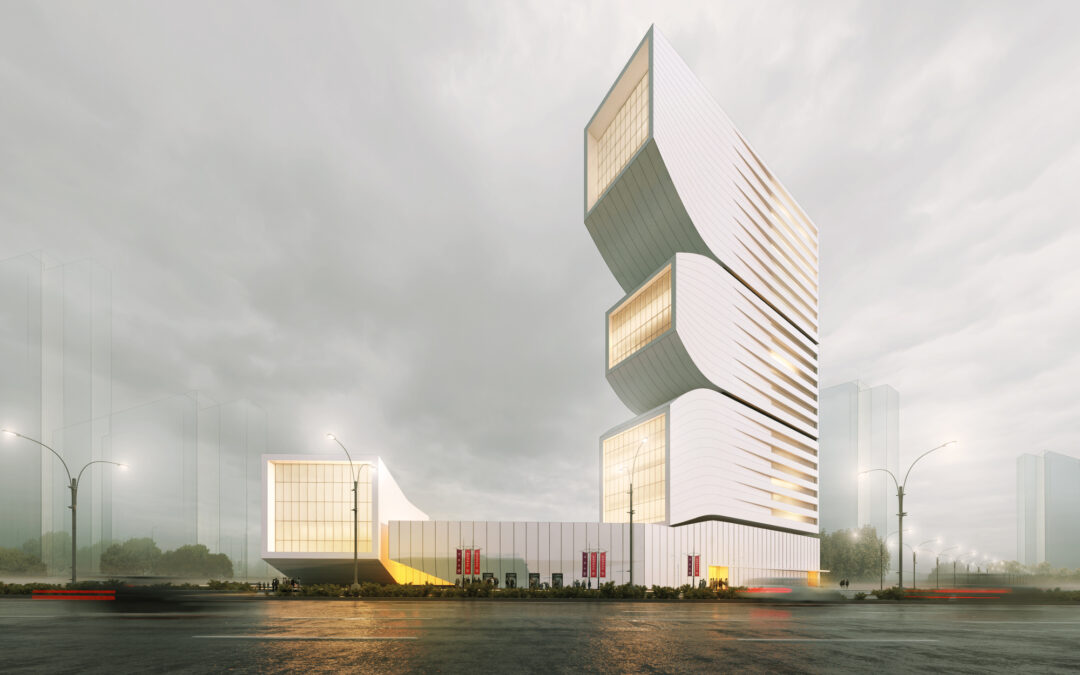A startup specializing in 3D-printed human organs is setting up a 20,000-square-foot manufacturing hub in Houston and preparing to be acquired in a deal that could be valued at $400 million.
Volumetric, a startup founded by Houston bioengineers from Rice University, has struck a deal to be acquired for $45 million by 3D Systems, a publicly traded additive manufacturing company based in South Carolina. The deal includes up to an additional $355 million for Volumetric shareholders if the startup reaches certain milestones by 2035, according to 3D Systems.
The acquisition is expected to close by the end of the year. Volumetric recently expanded its plans to build out a manufacturing facility in Houston’s East End Maker Hub, the new 300,000-square-foot industrial incubator developed by Urban Partnerships CDC and TxRX Labs. The expansion is a sign of Houston’s nascent but growing bioengineering sector as the city aims to become the so-called third coast for medical innovations and research.
“We will build out our R&D pipeline right here in Houston, next to the dozens of other innovative life sciences companies we have been working with, and alongside, for the past three years,” said Jordan Miller, co-founder and president of Volumetric, in a statement. Miller is also an associate professor of bioengineering at Rice University.
Miller and fellow Rice University researcher Bagrat Grigoryan founded Volumetric in 2018 in response to the need for organ transplants. More than 100,000 people are on transplant waiting lists in the United States, and those who do eventually receive donor organs often need a lifetime of immune-suppressing drugs to prevent organ rejection, according to Rice University. Eventually,
Volumetric plans to use its printers and technology to produce safe and functioning human organs to be used as life-saving transplants for patients who need a liver, kidney, pancreas, lung or heart.
“Manufacturing human organs represents a transformative opportunity to reduce serious organ disease,” said Grigoryan in a statement.
Different Manufacturing Space
Volumetric relies on a substance known as bioink, a type of liquid hydrogel that is mostly made of gelatin, to make the organs. The manufacturing space the company uses houses 3D printers that expose the bioink to light, setting off a chemical reaction that solidifies the materials that can then be used to build blood vessel structures. Donated human cells are then placed in the structures to create replacement organs and tissues.
In earlier interviews with CoStar News, Miller used the analogy of home construction: The framing and plumbing in the building have to be assembled before the residents can move in to the house. In this analogy, Volumetric builds the blood vessel “framing” the organ before installing the “plumbing,” or the actual blood vessels, and moving in the tissue cells or the “residents.”
Volumetric is continuing to study the compatibility of its “scaffolds,” or its manufactured structures meant to mimic human tissues, and is continuing to advance its bioprinting technology, Miller said in email to CoStar News. Volumetric makes the bioink and bioprinters in Houston.
The merger with 3D Systems will allow Volumetric to also participate in 3D Systems’ expanded partnership with biotech firm United Therapeutics Corp. The partnership developed a method for 3D-printing scaffolds for manufactured human lungs and now is expanding to develop techniques for 3D-printing other human organs, according to a release from 3D Systems.
Volumetric recently added nearly 9,000 square feet to its original lease at East End Maker Hub for a total of about 20,000 square feet. Miller will lead the new Houston facility.
The facility will house 3D Systems’ Houston operations for its regenerative medicine work, including print process development and biolab facilities, said Jeffrey Graves, president and CEO of 3D Systems, in an email to CoStar News.
“We are excited about the environment in Houston, and the leadership the Texas Medical Center is taking in establishing this region as a leader in biotechnology research,” Graves said.
Medical Space Demand
Houston has been expanding its life science sector and attracting more bioengineering activity and biomanufacturing prospects.
Other medical manufacturing companies have expanded their footprints in the Houston area in recent years, including the 1.3 million-square-foot distribution facility belonging to medical equipment maker Medline in Katy and vaccine maker VGXI’s 240,000-square-foot manufacturing facility that opened in 2020.
Houston was named one of the top 10 emerging life sciences markets to watch in part because of its high concentration of residents with degrees in STEM fields and its wages in the industry likely to attract talent, according to a report from brokerage JLL.
The Texas A&M University System recently picked Houston for its new engineering medical program that could fuel future growth in the biomanufacturing and life science sector in the city. The university system is building Horizon Tower in the Texas Medical Center area that will include 17 levels of life science space.
Earlier this year, the Texas Medical Center broke ground on TMC3, a 37-acre bioresearch campus. The Texas Medical Center has been working with Volumetric since its inception through its TMC Innovation and investment through its TMC Venture Fund.
Bill McKeon, president and CEO of the Texas Medical Center, said in a statement that the deal between Volumetric and 3D Systems “integrates seamlessly with our growing hub for life sciences and biofabrication here in Houston.”
Author Credit: CoStar

